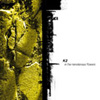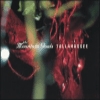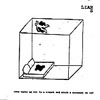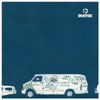 As the art punk progression tends more and more towards electronic experimentation, Black Dice are ready to offer their interpretation of the movement, fusing their improvisational noise rock with an electronic sound which calls to mind Beaver and Krause, and a musique concrete similar to Xenakis. There are clicks, beeps, voice samples, chirps, echoes, robots, chimes, wails, mystic hums, crunches, and Oriental pentatonic scales. The group's previous releases for the Gravity and Troubleman Unlimited labels were unbalanced by their composition: many extremely short, kinetic songs combined with one or two longer songs. Here, the songs start off long and get increasingly longer. The band chooses to employ its heretofore unexplored potential energy in these songs, rather than just brashly offering their kinetic formulae. It's fascinating to hear this evolution, particularly because I used to think Black Dice were one-trick ponies. Live shows of the band were always intense and fun, but not always well-suited for translation onto record. With this record they have proved me wrong, and have developed into a forceful and imaginative experimental collective to listen to in my room. What will be interesting to see is whether their new sound is adaptable to their explosive live performances. 'Beaches and Canyons' starts out with the six-minute long "Seabird," an appropriately maritime number which unmistakably features some perturbed plover signaling the unjust encroachment on its nesting sand dune with constant squawks. The plover may or may not be robotic, and may or may not actually be a tern. By the end of the song, the intruder has clearly left, but bird is still squawking, albeit a little less virulently. "The Dream is Going Down" takes us to a canyon where robot voices bounce of the eroding limestone walls, while during the last six minutes of "Endless Happiness," waves and tidal sounds wash over us as the supposedly interminable bliss eventually does fall off. By the time the seventeen minutes of "Big Drop," the last song, comes about, we have literally dropped from the canyons in an errant spelunking mission into a cave where sound bounces about violently and the vocals scream, recalling Black Dice's older output. Wherever we find ourselves by the end of the album, the echoes in the music remind us that we are still in Black Dice's canyons, while the crashing of waves reminds us that we still have one foot rooted on the shores of an undiscovered beach.
As the art punk progression tends more and more towards electronic experimentation, Black Dice are ready to offer their interpretation of the movement, fusing their improvisational noise rock with an electronic sound which calls to mind Beaver and Krause, and a musique concrete similar to Xenakis. There are clicks, beeps, voice samples, chirps, echoes, robots, chimes, wails, mystic hums, crunches, and Oriental pentatonic scales. The group's previous releases for the Gravity and Troubleman Unlimited labels were unbalanced by their composition: many extremely short, kinetic songs combined with one or two longer songs. Here, the songs start off long and get increasingly longer. The band chooses to employ its heretofore unexplored potential energy in these songs, rather than just brashly offering their kinetic formulae. It's fascinating to hear this evolution, particularly because I used to think Black Dice were one-trick ponies. Live shows of the band were always intense and fun, but not always well-suited for translation onto record. With this record they have proved me wrong, and have developed into a forceful and imaginative experimental collective to listen to in my room. What will be interesting to see is whether their new sound is adaptable to their explosive live performances. 'Beaches and Canyons' starts out with the six-minute long "Seabird," an appropriately maritime number which unmistakably features some perturbed plover signaling the unjust encroachment on its nesting sand dune with constant squawks. The plover may or may not be robotic, and may or may not actually be a tern. By the end of the song, the intruder has clearly left, but bird is still squawking, albeit a little less virulently. "The Dream is Going Down" takes us to a canyon where robot voices bounce of the eroding limestone walls, while during the last six minutes of "Endless Happiness," waves and tidal sounds wash over us as the supposedly interminable bliss eventually does fall off. By the time the seventeen minutes of "Big Drop," the last song, comes about, we have literally dropped from the canyons in an errant spelunking mission into a cave where sound bounces about violently and the vocals scream, recalling Black Dice's older output. Wherever we find ourselves by the end of the album, the echoes in the music remind us that we are still in Black Dice's canyons, while the crashing of waves reminds us that we still have one foot rooted on the shores of an undiscovered beach.
samples:


 K2, the prolific artist who arrived in the third wave of Japanese noise musicians and is currently one of the last ones standing (MSBR and Government Alpha are still relevant, Merzbow and Aube have descended into pathetic self-parody... and don't get me started on Keiji Haino, yeesh), has changed course. Rather than the metal-on-metal screech for which he has previously been known, K2's newest album is all fast-cut collage of drum machines, pop music, noises both harsh and not, and more flavors than I can now recount. A sound begins, then abruptly interrupts itself, occasionally doubling back only to fall apart and maybe be picked up by some incongrous thing. All sounds remain in place long enough to be plowed under by the next one, and K2 keeps the pace relentless for the full hour of the disc. And what a good time this album is! The absurd juxtapositions remind me of the Hafler Trio's 'A Thirsty Fish,' but with no pretense of sublimity. In fact, the sublime appears to be far from K2's range, he having opted instead for instant gratification, even if that means bringing in elements that shouldn't work (but, miraculously, they do). Some delay settings are painfully silly and banal, as are some 70s-era drum machine sounds and Western choral records, but these only enrich the sense of wide-eyed joy that the music evokes. So do the flourishes of human gesture; the clearly manual adjustment of a volume level, or the telltale clip of a computer splice, or the wildly variant fluctuations in dynamics and sound-quality all remind the listener that there is somebody driving, and that person has a clue where the music will lead. It's a damn fun ride.
K2, the prolific artist who arrived in the third wave of Japanese noise musicians and is currently one of the last ones standing (MSBR and Government Alpha are still relevant, Merzbow and Aube have descended into pathetic self-parody... and don't get me started on Keiji Haino, yeesh), has changed course. Rather than the metal-on-metal screech for which he has previously been known, K2's newest album is all fast-cut collage of drum machines, pop music, noises both harsh and not, and more flavors than I can now recount. A sound begins, then abruptly interrupts itself, occasionally doubling back only to fall apart and maybe be picked up by some incongrous thing. All sounds remain in place long enough to be plowed under by the next one, and K2 keeps the pace relentless for the full hour of the disc. And what a good time this album is! The absurd juxtapositions remind me of the Hafler Trio's 'A Thirsty Fish,' but with no pretense of sublimity. In fact, the sublime appears to be far from K2's range, he having opted instead for instant gratification, even if that means bringing in elements that shouldn't work (but, miraculously, they do). Some delay settings are painfully silly and banal, as are some 70s-era drum machine sounds and Western choral records, but these only enrich the sense of wide-eyed joy that the music evokes. So do the flourishes of human gesture; the clearly manual adjustment of a volume level, or the telltale clip of a computer splice, or the wildly variant fluctuations in dynamics and sound-quality all remind the listener that there is somebody driving, and that person has a clue where the music will lead. It's a damn fun ride. The Mountain Goats have finally released a true Euripidean goat song, a sparkling Floridian tragedy which places an alcoholic couple whose once true love has soured in a two-story bungalow filled with cases of vodka and ashtrays teeming with stale cigarette butts. We have seen this couple before: they inhabit all the songs with "Alpha" in the title. The difference is now their exploits are being documented with the assistance of a fancy recording studio, sometimes even complemented by bass, drums, piano, and other instruments.
The Mountain Goats have finally released a true Euripidean goat song, a sparkling Floridian tragedy which places an alcoholic couple whose once true love has soured in a two-story bungalow filled with cases of vodka and ashtrays teeming with stale cigarette butts. We have seen this couple before: they inhabit all the songs with "Alpha" in the title. The difference is now their exploits are being documented with the assistance of a fancy recording studio, sometimes even complemented by bass, drums, piano, and other instruments. When Guided By Voices initially left Matador Records to record with TVT, it was rumored that the main point of contention was Rob Pollard's prolific songwriting, and his inability to concentrate on just one release. Solo records, records under different band names, EPs, and singles dotted the marketplace from GBV, and Gerard Cosloy wished Pollard wouldn't cause fans confusion over which release to buy. After all, who has money to buy 9 releases a year from Mr. Pollard? (Especially when some of which aren't any good.)
When Guided By Voices initially left Matador Records to record with TVT, it was rumored that the main point of contention was Rob Pollard's prolific songwriting, and his inability to concentrate on just one release. Solo records, records under different band names, EPs, and singles dotted the marketplace from GBV, and Gerard Cosloy wished Pollard wouldn't cause fans confusion over which release to buy. After all, who has money to buy 9 releases a year from Mr. Pollard? (Especially when some of which aren't any good.) Not so conceptual, not sad or very beautiful, not likely to persist in its impression, Liars simply grab onto immediate, relentless hooks and make urgent, funky fun. It's like this: three-minute songs with slithery disco-punk bass lines, given a slightly chilly imperviousness by sparse synthesizers and walkie-talkie barked vocals. Good stuff, with the exception of the last track, which ends in a looped locked-groove, extending over 30 minutes! (An excuse to make an "album" out of an EP?) Go figure, because this plodding bore is the complete opposite of the album's leading tracks.
Not so conceptual, not sad or very beautiful, not likely to persist in its impression, Liars simply grab onto immediate, relentless hooks and make urgent, funky fun. It's like this: three-minute songs with slithery disco-punk bass lines, given a slightly chilly imperviousness by sparse synthesizers and walkie-talkie barked vocals. Good stuff, with the exception of the last track, which ends in a looped locked-groove, extending over 30 minutes! (An excuse to make an "album" out of an EP?) Go figure, because this plodding bore is the complete opposite of the album's leading tracks. Chicago's Diverse is twenty-five year old MC Kenny Jenkins, who has been making a name for himself through his craft and collaborations with the mighty Mos Def, Prefuse 73 (see Wylin' Out review) as well as Isotope 217 members Matt Lux and Jeff Parker. At one time a mail delivery driver for a local university (that's his van on the cover), Jenkins honed his MC skills and released an EP entitled "Move." This follow-up EP is a taste of what's in store when a full length release materializes later this year. "Certified" is chock full of socially conscious lyrics which flow relaxed and steadily against the dirty funk guitar driven groove, produced by RJD2, which would sound right at home on one of those 70s 'Pulp Fusion' compilations. Jenkins gives a tight vocal delivery on "Build" over K-Kruz's jazzier channeled production which makes use of subtle muted trumpet and gives a nice and chill kinda feel. Both of these tunes also appear as instrumental versions, which highlight elements in backing tracks that would not draw as much attention with vocals over top. Of course, there's also the obligatory radio edi*s, so as not to piss anyone *ff. Based on this EP, Diverse is a name to keep your ear open for.
Chicago's Diverse is twenty-five year old MC Kenny Jenkins, who has been making a name for himself through his craft and collaborations with the mighty Mos Def, Prefuse 73 (see Wylin' Out review) as well as Isotope 217 members Matt Lux and Jeff Parker. At one time a mail delivery driver for a local university (that's his van on the cover), Jenkins honed his MC skills and released an EP entitled "Move." This follow-up EP is a taste of what's in store when a full length release materializes later this year. "Certified" is chock full of socially conscious lyrics which flow relaxed and steadily against the dirty funk guitar driven groove, produced by RJD2, which would sound right at home on one of those 70s 'Pulp Fusion' compilations. Jenkins gives a tight vocal delivery on "Build" over K-Kruz's jazzier channeled production which makes use of subtle muted trumpet and gives a nice and chill kinda feel. Both of these tunes also appear as instrumental versions, which highlight elements in backing tracks that would not draw as much attention with vocals over top. Of course, there's also the obligatory radio edi*s, so as not to piss anyone *ff. Based on this EP, Diverse is a name to keep your ear open for. Fans and critics have uncontrollable tendencies to place far too many expectations on something they had no expectations of to begin with. Think back to the first time you heard this Canadian collective: there was something about that very moment which COMMANDED your attention whether you care to admit it or not, even if you like the band or not. The sound was fresh and warmly welcomed, grand and overwhelming at times. Transcending a number of genres, there was little room for comparisons or classifications. They achieved something which my friend, Jeremy, of Temporary Residence considers a mark of success: people started comparing -other- things to them. There was something more, however—something almost indescribable and intangible—which started out like a small mystery and has built to a frenzied, inescapable force-field which surrounds this simple instrumental rock group. Godspeed certainly could share the blame of setting the winds in motion—perhaps due to the choices of samples and the use of symbols and messages tucked inside artwork or projected on the stage screens. Couple these with a feverish, caustic and sensational media, aching for a soundbyte to exploit or an individual to single out, and things can easily spin out of control.
Fans and critics have uncontrollable tendencies to place far too many expectations on something they had no expectations of to begin with. Think back to the first time you heard this Canadian collective: there was something about that very moment which COMMANDED your attention whether you care to admit it or not, even if you like the band or not. The sound was fresh and warmly welcomed, grand and overwhelming at times. Transcending a number of genres, there was little room for comparisons or classifications. They achieved something which my friend, Jeremy, of Temporary Residence considers a mark of success: people started comparing -other- things to them. There was something more, however—something almost indescribable and intangible—which started out like a small mystery and has built to a frenzied, inescapable force-field which surrounds this simple instrumental rock group. Godspeed certainly could share the blame of setting the winds in motion—perhaps due to the choices of samples and the use of symbols and messages tucked inside artwork or projected on the stage screens. Couple these with a feverish, caustic and sensational media, aching for a soundbyte to exploit or an individual to single out, and things can easily spin out of control. Black Heart Procession's fourth album marks a divergence away from the band's convention to number each album consecutively, so it should not surprise anyone that the sound of the band has also undergone a change. Within the first few minutes of the album, there are unprecedented female backing vocals which persist throughout the record and end up feeling like more of an indulgence than an affectation. "Amore del Tropico" is supposedly an overture to a murder mystery. Like anyone who has seen the band's live shows, which are robust with masks, disguises, and theatrical distance, I was at first skeptical about the sincerity of this project as a true murder mystery. After hearing "Tropics of Love," the first full-fledged song after a brief opening number, my skepticism disappeared. The song begins with a snazzy up-tempo beat to which you could snap your fingers, and you begin to wonder if they are scoring some lost Raymond Chandler novel, as this song could easily fit into the opening titles sequence. Interestingly, there is an 'Amore del Tropico' DVD forthcoming which will flesh out the narrative of this tropical murder mystery, with each song from the album creating a new chapter. It will be interesting to see if this project ever materializes. From what we have at hand now, I don't think I could tell you who was killed, where it occurred, or what the murder weapon was, let alone solve the crime. Perhaps my bumbling sleuthing is due to the fact that I find it hard to get drawn into this album like the previous Black Heart Procession records. I found myself distracted while listening to the album, trying to piece together the underlying mystery, but disgruntled knowing that I was never very good at solving even the most rudimentary Encyclopedia Brown case. The one time I was fully aware of the album's concept was in "Fingerprints," when singer Pall Jenkins repeats, "They found my fingerprints," amidst a wailing violin which is reminiscent of the fiddle from Bob Dylan's 'Desire' album. While adopting the mood of the murder mystery, the Black Heart Procession have forsaken their signature mood of old, which was grave, dense and swirling. Despite the macabre subject, the newly forged mood seems light and comical. "A Cry for Love" would be a song of the old Black Heart mood, were it not for the punctuating female backing vocals, which sound like they were culled from Isaac Hayes's "Theme from Shaft." The finale, "The One Who Disappeared," returns reluctantly to the older Black Heart sound, and it is comforting to know that, now that the murder mystery has dwindled down to its final clues, and all the leads and hunches have been followed to their end, the band at last can retrace its footsteps back to where they began and start again from where they left off.
Black Heart Procession's fourth album marks a divergence away from the band's convention to number each album consecutively, so it should not surprise anyone that the sound of the band has also undergone a change. Within the first few minutes of the album, there are unprecedented female backing vocals which persist throughout the record and end up feeling like more of an indulgence than an affectation. "Amore del Tropico" is supposedly an overture to a murder mystery. Like anyone who has seen the band's live shows, which are robust with masks, disguises, and theatrical distance, I was at first skeptical about the sincerity of this project as a true murder mystery. After hearing "Tropics of Love," the first full-fledged song after a brief opening number, my skepticism disappeared. The song begins with a snazzy up-tempo beat to which you could snap your fingers, and you begin to wonder if they are scoring some lost Raymond Chandler novel, as this song could easily fit into the opening titles sequence. Interestingly, there is an 'Amore del Tropico' DVD forthcoming which will flesh out the narrative of this tropical murder mystery, with each song from the album creating a new chapter. It will be interesting to see if this project ever materializes. From what we have at hand now, I don't think I could tell you who was killed, where it occurred, or what the murder weapon was, let alone solve the crime. Perhaps my bumbling sleuthing is due to the fact that I find it hard to get drawn into this album like the previous Black Heart Procession records. I found myself distracted while listening to the album, trying to piece together the underlying mystery, but disgruntled knowing that I was never very good at solving even the most rudimentary Encyclopedia Brown case. The one time I was fully aware of the album's concept was in "Fingerprints," when singer Pall Jenkins repeats, "They found my fingerprints," amidst a wailing violin which is reminiscent of the fiddle from Bob Dylan's 'Desire' album. While adopting the mood of the murder mystery, the Black Heart Procession have forsaken their signature mood of old, which was grave, dense and swirling. Despite the macabre subject, the newly forged mood seems light and comical. "A Cry for Love" would be a song of the old Black Heart mood, were it not for the punctuating female backing vocals, which sound like they were culled from Isaac Hayes's "Theme from Shaft." The finale, "The One Who Disappeared," returns reluctantly to the older Black Heart sound, and it is comforting to know that, now that the murder mystery has dwindled down to its final clues, and all the leads and hunches have been followed to their end, the band at last can retrace its footsteps back to where they began and start again from where they left off. This cornucopia of Hip-Hop-styled and inspired music makes for a perfect primer for the new directions in which this music is thriving, from an independent, non-bling-bling standpoint. The Chicago-based Chocolate Industries label has put together a choice compilation featuring a plethora of artists which include members of the Def Jux familia such as Aesop Rock and Mr. Lif, Prefuse 73, Diverse, Cibo Matto's Miho Hatori and DJ Food. Opening the disc is a college radio sounding ad listing the guest appearances which launches into Prefuse 73's "Radio Attack Pt.2" which has some cool breaks that vary from the version on his 'Vocal Studies + Uprock Narratives' release. Souls of Mischief's "Spark" provides a head-nodding groove filled with some simple yet great organ samples while proclaiming, "We align with the planets and stars / Advancing the art form whenever we spar." RJD2's "True Confessions" chronicles the satirical church confessions of a seventeen year old stereo thief and burglar to a shocked and surprised priest, set to a rocking backing track of pounding drums and distorted guitar samples. El-P's signature backing track and sharp lyrics ring out in "Deadlight" with vocal plays on Apple's FireWire and Apocalypse Now, complete with a reference to 70s fusion heads Emerson Lake and Palmer and Pavlov. This is one of the more thought provoking tracks on the disc that'll have ya hitting the back skip button to make sure you caught it all. In the "surprise surprise" department—but then again, not really—is Tortoise with their contribution "C.T.A.," which has a real remix feel to it. Comprised of clipped live drums, synth patches and processed guitar, the track builds with repetition throughout the clever, winding progression. At about the halfway mark, the most anticipated and monstrous bassline kicks in and pulls it home. Overall, the disc's eighteen tracks play through as if you were listening to a hip college radio program, complete with brief interludes from Prefuse 73 and altered chit-chat.
This cornucopia of Hip-Hop-styled and inspired music makes for a perfect primer for the new directions in which this music is thriving, from an independent, non-bling-bling standpoint. The Chicago-based Chocolate Industries label has put together a choice compilation featuring a plethora of artists which include members of the Def Jux familia such as Aesop Rock and Mr. Lif, Prefuse 73, Diverse, Cibo Matto's Miho Hatori and DJ Food. Opening the disc is a college radio sounding ad listing the guest appearances which launches into Prefuse 73's "Radio Attack Pt.2" which has some cool breaks that vary from the version on his 'Vocal Studies + Uprock Narratives' release. Souls of Mischief's "Spark" provides a head-nodding groove filled with some simple yet great organ samples while proclaiming, "We align with the planets and stars / Advancing the art form whenever we spar." RJD2's "True Confessions" chronicles the satirical church confessions of a seventeen year old stereo thief and burglar to a shocked and surprised priest, set to a rocking backing track of pounding drums and distorted guitar samples. El-P's signature backing track and sharp lyrics ring out in "Deadlight" with vocal plays on Apple's FireWire and Apocalypse Now, complete with a reference to 70s fusion heads Emerson Lake and Palmer and Pavlov. This is one of the more thought provoking tracks on the disc that'll have ya hitting the back skip button to make sure you caught it all. In the "surprise surprise" department—but then again, not really—is Tortoise with their contribution "C.T.A.," which has a real remix feel to it. Comprised of clipped live drums, synth patches and processed guitar, the track builds with repetition throughout the clever, winding progression. At about the halfway mark, the most anticipated and monstrous bassline kicks in and pulls it home. Overall, the disc's eighteen tracks play through as if you were listening to a hip college radio program, complete with brief interludes from Prefuse 73 and altered chit-chat.  Don't blame Canada. It just so happens they have some pretty damn fantastic songwriters. Current exhibit Hayden took the music industry by storm with his self-recorded and self-released debut 'Everything I Long For'. The storm was big enough for him to get signed to Geffen imprint Outpost. Woe to those on Outpost, though, after the Unigram merger, as the label was dissolved in the deal. Many of the artists were snatched up by other labels, but Hayden was left in the cold after the mixed-bag sophomore slump of his second CD, 'The Closer I Get'. So he hibernated. And waited. And went back to his roots, recording again in his home with some close friends. The results are this underrated album that was originally planned as a 1000 copy limited addition, but was snatched up by Badman after demand was high. Not a departure by any means, 'Skyscraper National Park' is instead signs of introspective growth as well as hope for this talented songwriter to finally get the attention he deserves. Where previous works have featured Hayden's low growl, this record has him singing quite capably, even touching Kurt Wagner territory on a few songs. The primary modus operandi hasn't changed, though. Slower, melodic folk rock songs with quirky lyrics are the order of the day, with electric guitar used as a squelch tool and noisemaker on such fare as "Dynamite Walls". And Hayden is clearly finding his voice again after almost three years away from recording. He's a little hesitant, and less than perfect vocally on these songs, but it's still refreshing compared to other home-recorded CDs being released these days. My only complaint is it's length - eleven songs at just over thirty-nine minutes is better than most, but after three years I wanted to hear more. All told, though, it's a great indication where Hayden is now, and where this wave might take him. Look for Hayden's recent live album in addition, as word is it's brilliant.
Don't blame Canada. It just so happens they have some pretty damn fantastic songwriters. Current exhibit Hayden took the music industry by storm with his self-recorded and self-released debut 'Everything I Long For'. The storm was big enough for him to get signed to Geffen imprint Outpost. Woe to those on Outpost, though, after the Unigram merger, as the label was dissolved in the deal. Many of the artists were snatched up by other labels, but Hayden was left in the cold after the mixed-bag sophomore slump of his second CD, 'The Closer I Get'. So he hibernated. And waited. And went back to his roots, recording again in his home with some close friends. The results are this underrated album that was originally planned as a 1000 copy limited addition, but was snatched up by Badman after demand was high. Not a departure by any means, 'Skyscraper National Park' is instead signs of introspective growth as well as hope for this talented songwriter to finally get the attention he deserves. Where previous works have featured Hayden's low growl, this record has him singing quite capably, even touching Kurt Wagner territory on a few songs. The primary modus operandi hasn't changed, though. Slower, melodic folk rock songs with quirky lyrics are the order of the day, with electric guitar used as a squelch tool and noisemaker on such fare as "Dynamite Walls". And Hayden is clearly finding his voice again after almost three years away from recording. He's a little hesitant, and less than perfect vocally on these songs, but it's still refreshing compared to other home-recorded CDs being released these days. My only complaint is it's length - eleven songs at just over thirty-nine minutes is better than most, but after three years I wanted to hear more. All told, though, it's a great indication where Hayden is now, and where this wave might take him. Look for Hayden's recent live album in addition, as word is it's brilliant.
